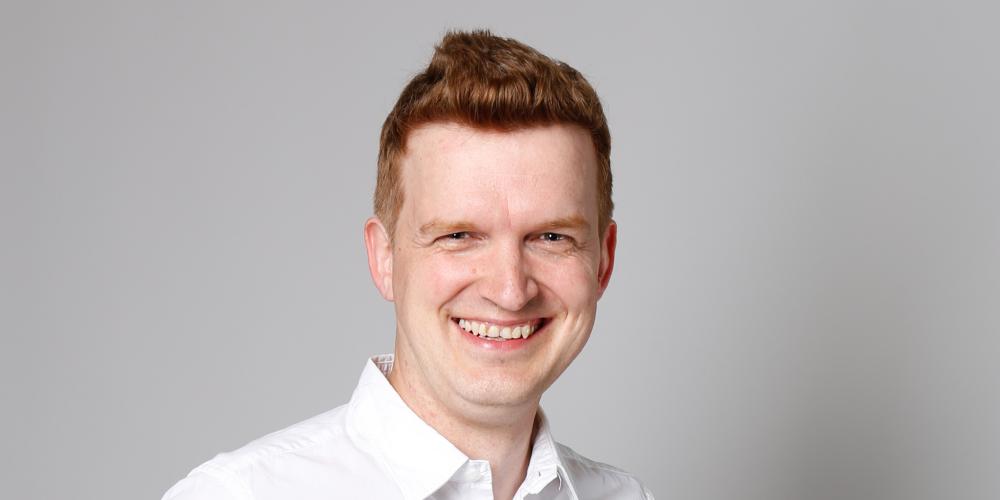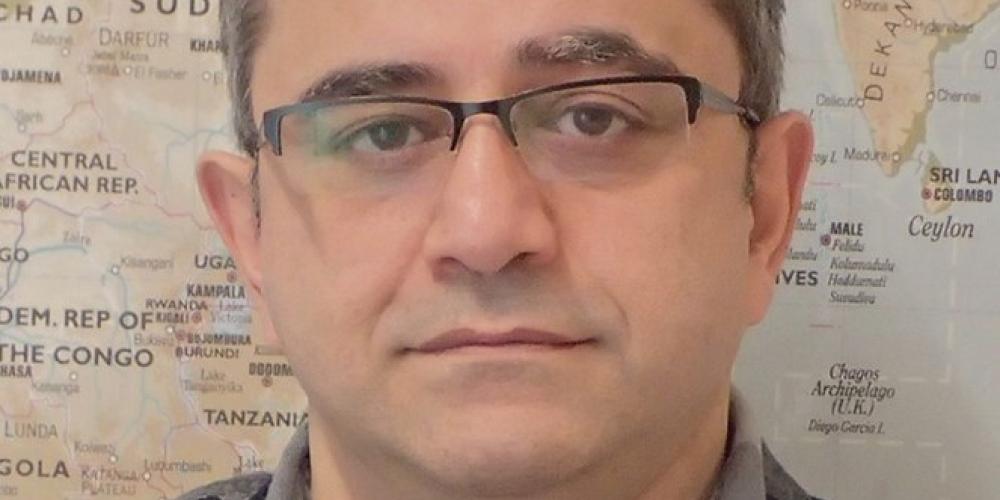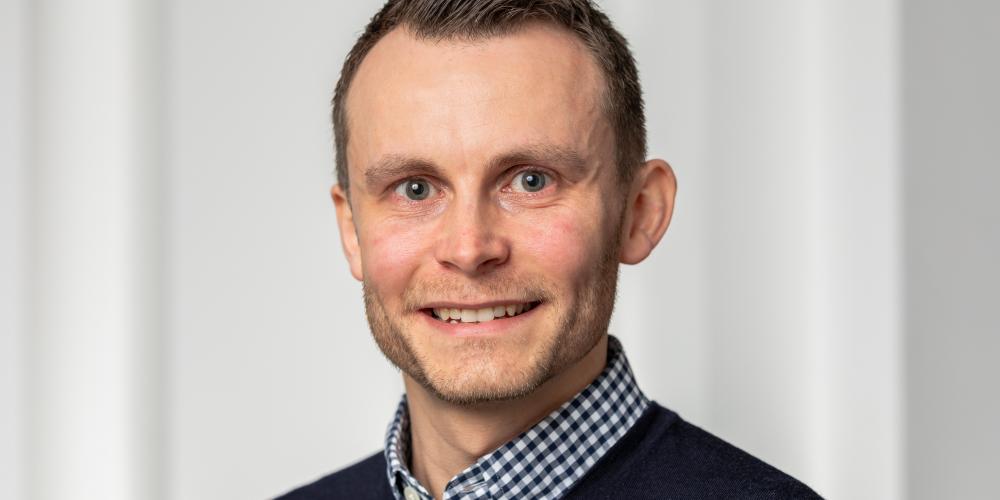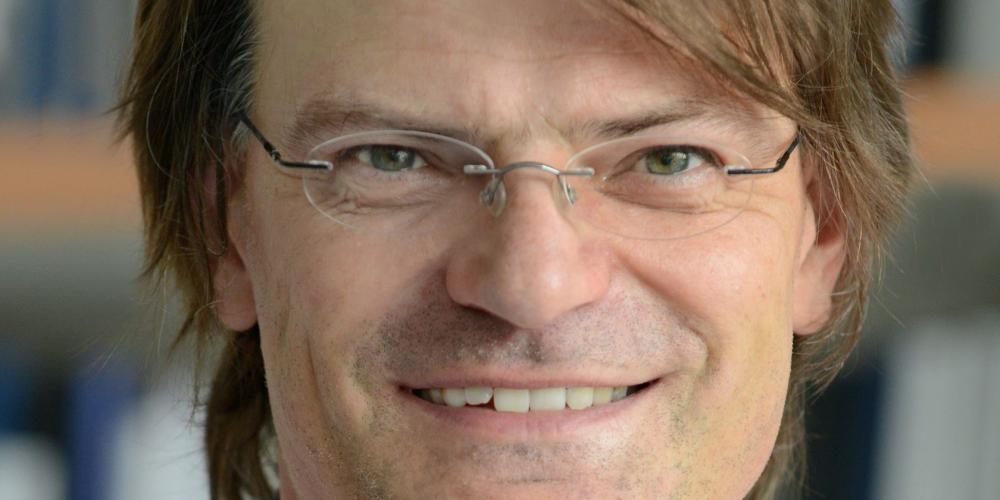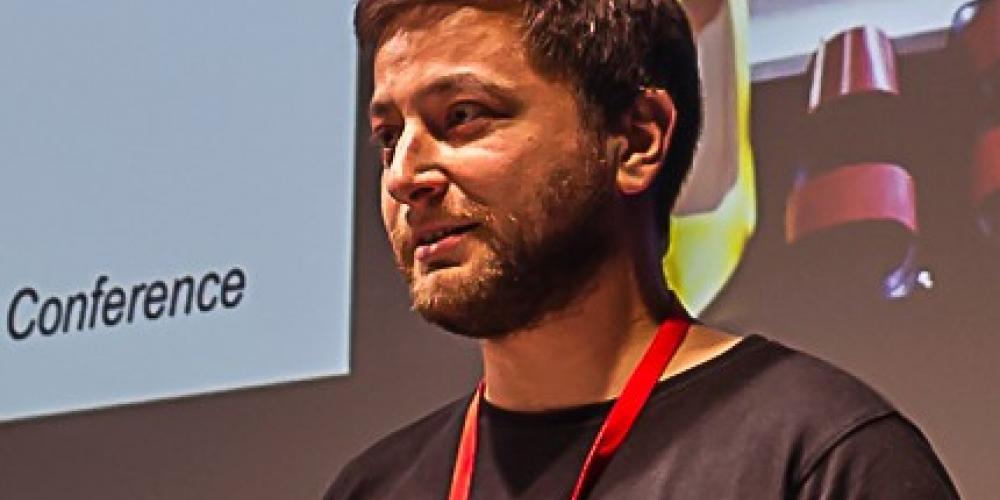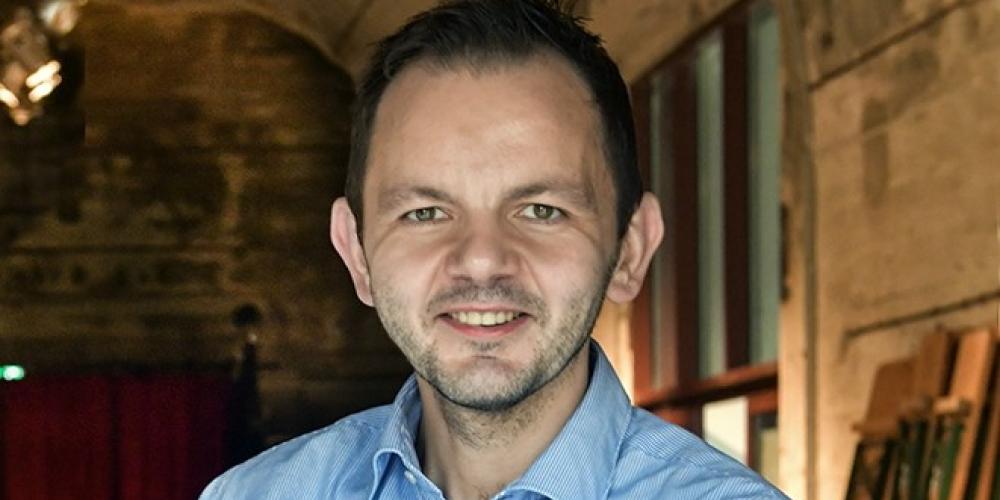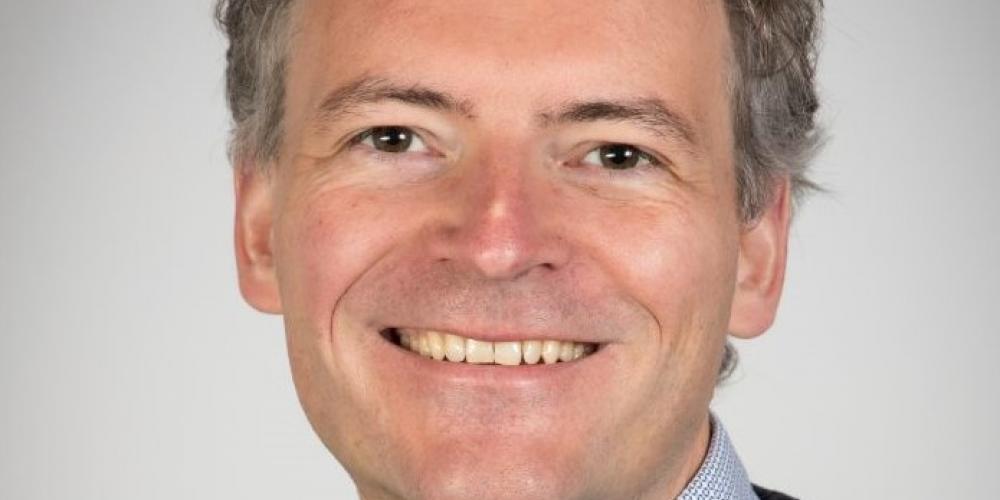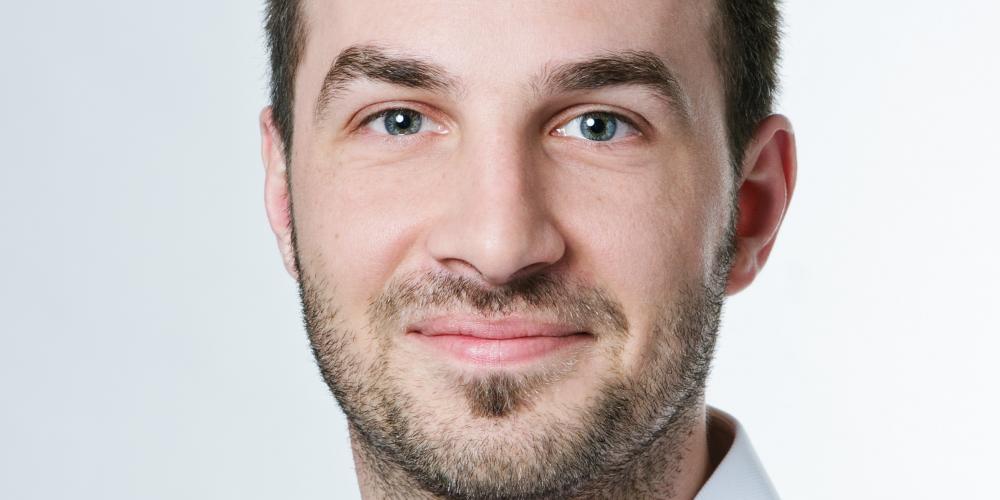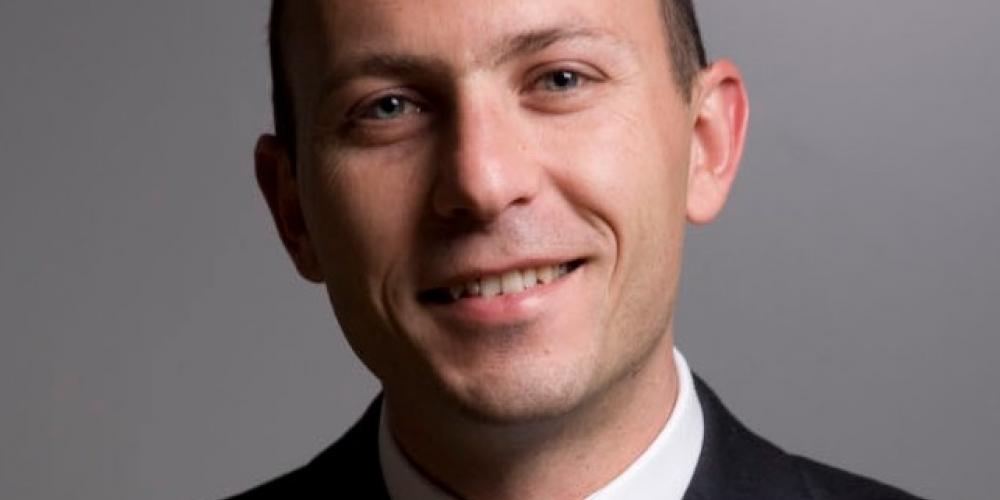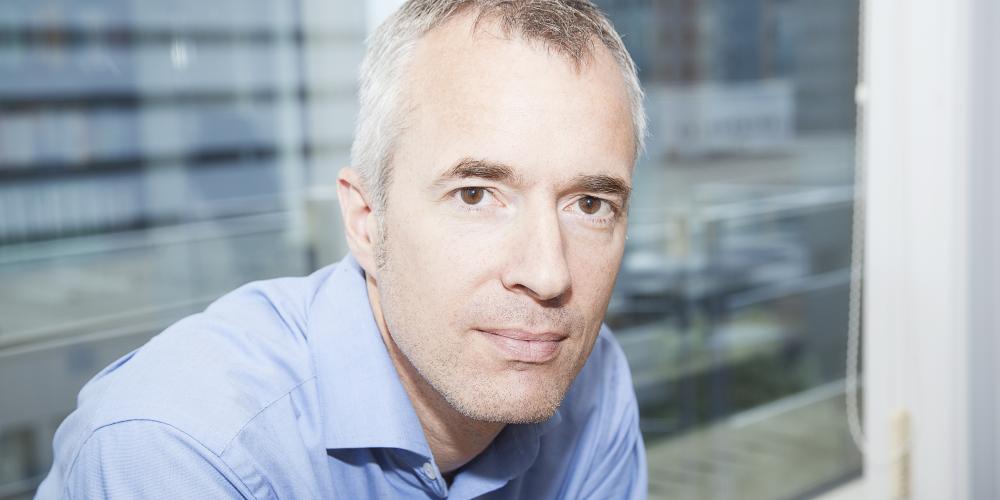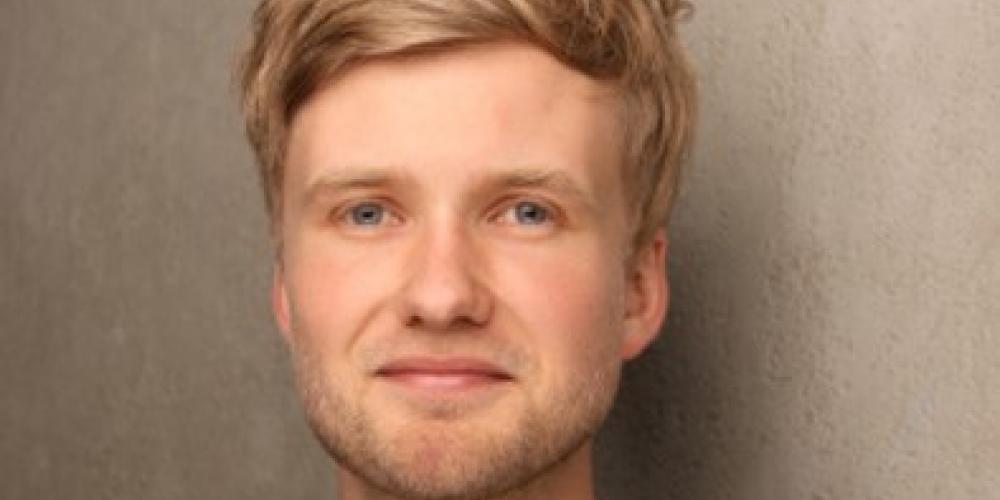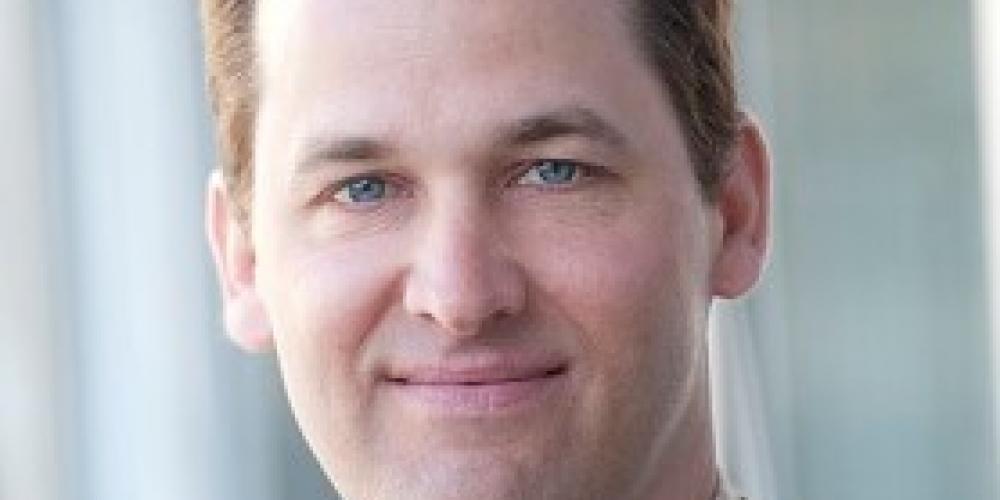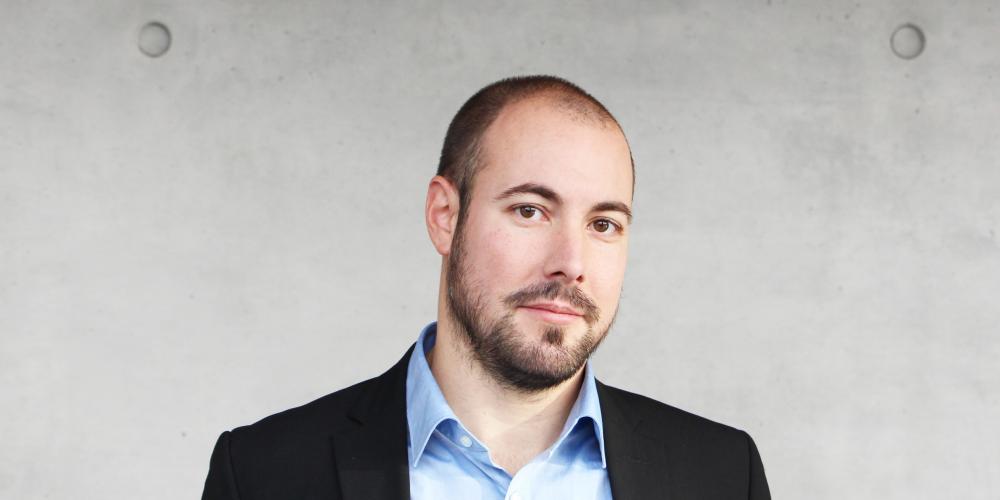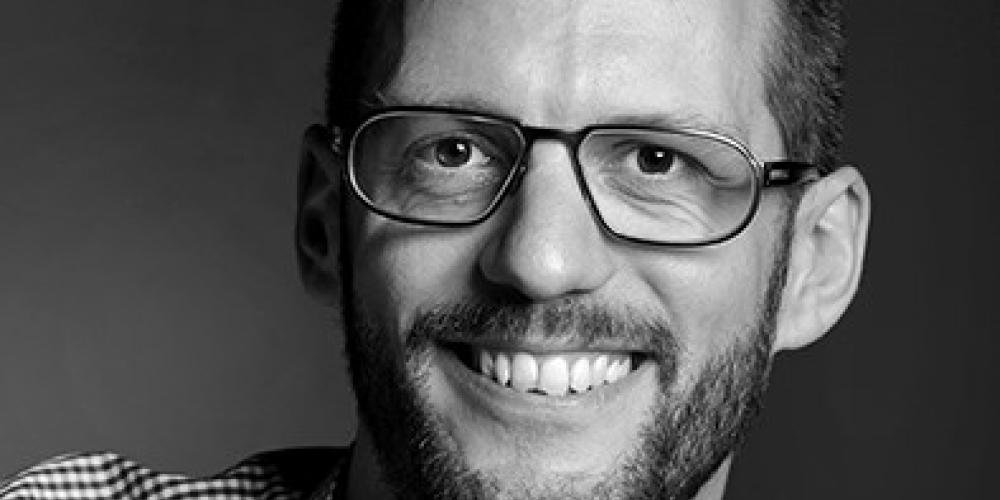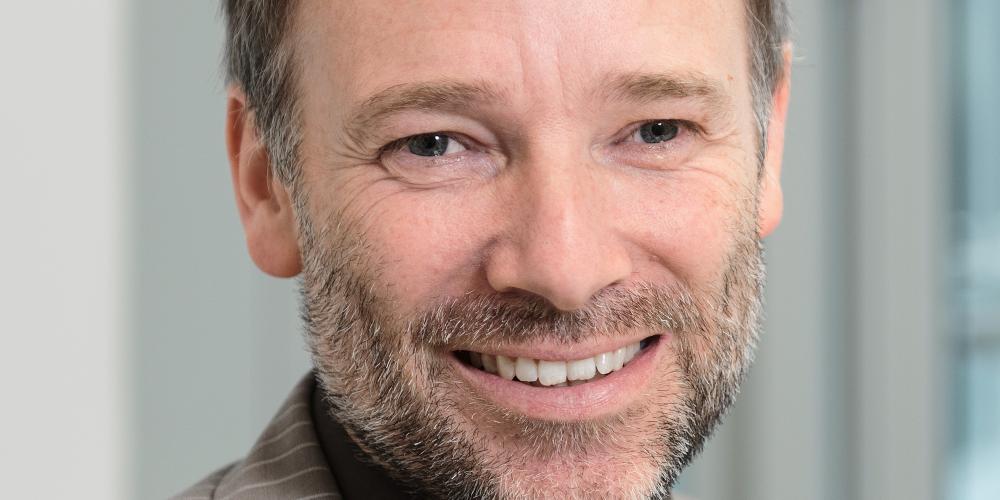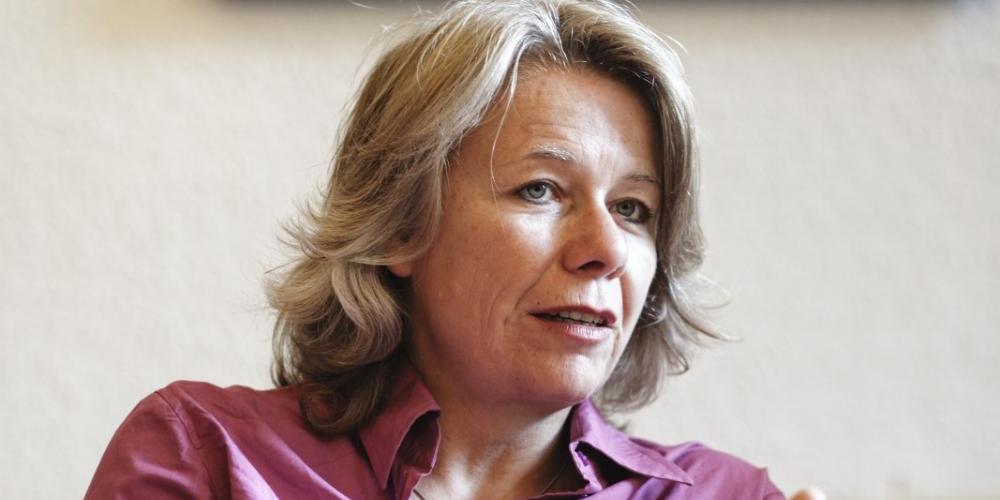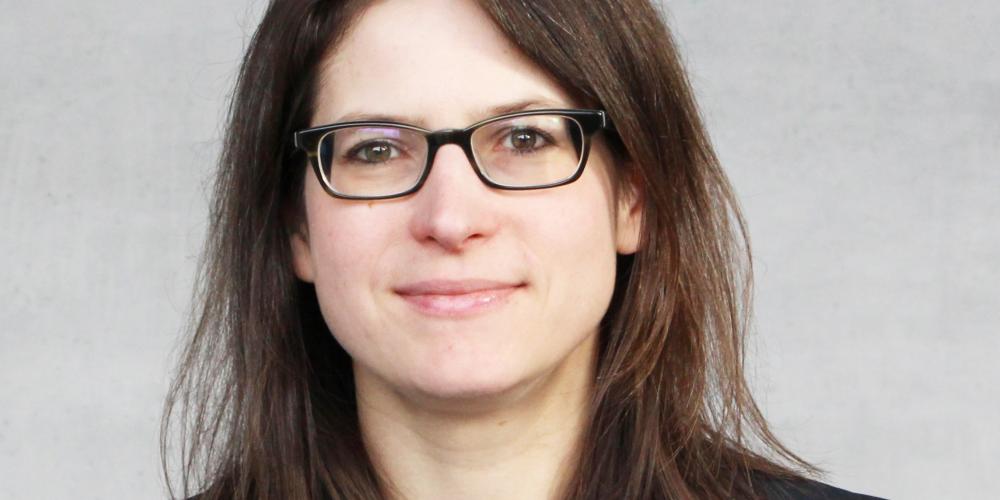Faculty of Mathematics and Natural Sciences
Professor Zender and his team at the Chair of "Didactics of Computer Science | Informatics and Society" work on a wide range of topics related to educational technologies, the teaching methodology of computer science and socio-technical systems. He focuses on the use of immersive technologies such as virtual and augmented reality in teaching and learning settings. His activities concentrate on the design and development of such VR and AR systems. In his projects, Professor Zender always collaborates with a wide network of interdisciplinary partners from the fields of computer science, media didactics, media pedagogy and various other.
In addition, Professor Zender is the deputy speaker of the specialist group on educational technologies of the German Informatics Society (GI) and initiator of the GI working group on VR/AR-Learning.
- Consulting on the use of educational technologies in concrete teaching and learning settings
- Conception and development of learning-effective applications with virtual and augmented reality (VR/AR)
- Conducting lectures and training courses on the topic of "Teaching and Learning with VR/AR"
- Cooperation with companies and research institutions from vocational education and training: conception and development of teaching/learning systems, realisation of transfer events
- Cooperation with training institutions from the automotive industry in particular: development of VR simulations for training purposes
- Cooperation with companies from the IT sector (e.g. providers of learning systems): design and development of teaching/learning systems
- Cooperation with scientific institutions (universities, private research institutions, etc.): implementation of research projects, scientific events and transfer activities as well as community work
Teaching and Learning with Virtual and Augmented Reality
State of Berllin
Berlin Senate Administration
Public authorities and associations
PD Dr. Mohsen Makki and his research group Soil Geography and Geomorphology have been dealing with soil-forming processes and properties of soils in urban areas for about two decades.
The scope of work includes all types of anthropogenically influenced sites (e.g. military sites, airports) that have been transformed by humans in the course of urban development, and natural soils. A main focus has been and will be the integration of the results of the soil investigations into soil protection concepts and landscape design measures with regard to climate change and other urban and landscape planning development concepts.
The working group continues to participate in geoarchaeological projects and supports non-university partners in the development of systems as well as substrates for vertical farming and green roofs. Regional focal points of research are the metropolitan region Berlin/Brandenburg, Italy, West and Central Asia.
- Soil-sedimentological and geomorphological expertise
- Soil-scientific site evaluation of urban and rural soils according to BBodSchG and BBodSchV
- Geoarchaeological site evaluation
- Creation of soil experience paths
- Creation of soil substrates for vertical farming and indoor farming
- Grain size analysis by means of Beckman-COULTER and Köhn apparatus
- Standard soil analyses (humus content, pH-value, lime content, electrical conductivity)
- Temperature-dependent determination of carbon content by loss on ignition
- Measurement of nutrient and heavy metal contents in soils and sediments according to DIN and VDLUFA, measurement by ICP-OES
- Soil science investigations in the Berlin/Brandenburg metropolitan region (Tempelhof Airport, Tegel Airport, Parks Range, Teufelsberg, etc.)
- Development of a pedological mapping guide for the state of Berlin
- Preparation of pedological reports for the Berlin Senate Administration
- Site analyses for public authorities and associations
industrial companies and research institutions
security company
Prof. Florian Tschorsch and his team research interests revolve around the analysis and design of distributed systems, in particular network architectures and communication protocols. Here, the inherent implementation of data protection and security requirements in a networked environment represents the overarching research goal. Furthermore, the interaction with other system properties such as resilience, scalability, performance and decentralization is considered. Within this framework, topics such as anonymity or weak identities, data privacy, telemetry infrastructures, peer-to-peer networks, and blockchain technologies are explored.
In addition to this technical expertise, the team is also experienced in collaborating on a wide range of interdisciplinary projects, for example in exchanges with lawyers, economists, and data analysts.
- Threat modeling with regard to data protection, data security and network security
- Network measurements and simulations
- Design and analysis of resilient distributed systems and algorithms
- Consulting on the handling of unauthenticated digital identities
- Consulting on the use and integration of blockchain technologies
- Project work in interdisciplinary teams consisting of industrial companies and research institutions
- Cooperation with a security company on the topic of digital identities and IT infrastructures
- Implementation of pilot projects in real applications
- Mentoring or consulting for startups and companies in the area of network security and blockchains
City of Munich
vhw Bundesverband für Wohnen und Stadtentwicklung (Federal Association for Housing and Urban Development)
FGW - Forschungsinstitut für die gesellschaftliche Weiterentwicklung (North Rhine-Westphalia)
CBRE
Prof. Nuissl is concerned with the development of cities and regions. He investigates the growth of cities and settlement areas, dynamics on the housing market (esp. displacement processes) as well as the development of city districts and neighborhoods. In addition, one focus of his work is the analysis of municipal planning and policy processes. As a member of the Integrative Research Institute on Transformations of Human-Environment Systems (IRI THESys), Prof. Nuissl has excellent interdisciplinary connections in his field of research.
- Contract research (qualitative and quantitative social science methods)
- Expert reports
-
City of Munich: Case Study on Displacement Processes in the Housing Market and Derivation of Urban Policy Implications (https://www.muenchen.de/rathaus/Stadtverwaltung/Referat-fuer-Stadtplanu…)
-
vhw Bundesverband für Wohnen und Stadtentwicklung (Federal Association for Housing and Urban Development): Study on the change of local political cultures in a polarized society
-
FGW - Forschungsinstitut für die gesellschaftliche Weiterentwicklung (North Rhine-Westphalia): Study on the integration of migrants in the neighborhood (https://www.fgw-nrw.de/forschungsergebnisse/forschungsergebnisse/projek…)
-
CBRE: Data collection on student housing in Germany
-
IRI THESys - Integrative Research Institute on Transformations of Human-Environment Systems at the Humboldt University of Berlin
Prof. Dr. Alan Akbik conducts research in the field of machine learning (ML) and natural language processing (NLP). His goal is to enable machines to capture, understand, and use natural language like a human.
To this end, he has developed one of the world's leading deep learning frameworks for NLP, which is already being used in over 1,000 research and industrial projects.
Consulting in:
- Deep Learning
- Natural Language Processing (NLP)
- Machine Learning (ML)
- 3 Patents at IBM Research
- Zalando Outstanding Achievement Award
The World Economic Forum (WEF)
Berlin SME
Chemspeed Technologies Ltd
Professor Bojdys research focuses on the design of covalent organic polymers with applications as organic transistor devices and on light-reactive polymers (e.g., Nat. Commun. 2019. DOI: 10.1038/s41467-019-11264-z). He and his team cooperate with established battery and coating companies and with a Berlin SME.
Since 2018, Professor Bojdys has been a member of the "Young Scientists" at the World Economic Forum (WEF) and further serves on their advisory board since 2019.
- Gas sorption analysis: Quantachrome Instruments Autosorb IQ (probegases: N2, Ar).
- Robotic synthesis & formulation: ChemSpeed ASW 2000
- X-ray diffractometers (Cu and Mo radiation, transmittance, Bragg-Brentano and reflectonomy configuration).
- groupwork focusing on flexible batteries with a Berlin SME
- cooperation on robot-assisted synthesis with Chemspeed Technologies Ltd.
- collaboration with The World Economic Forum (WEF)
- council member at "Young Scientists"
- WO/2020/216408 - RECHARGEABLE LITHIUM-ION BATTERY ANODE, AND METHOD FOR PRODUCING A RECHARGEABLE LITHIUM-ION BATTERY ANODE
- WO/2016/027042 - TWO-DIMENSIONAL CARBON NITRIDE MATERIAL AND METHOD OF PREPARATION
- ERC Proof of Concept Grant (Ultra-high energy storage Li-anode materials - LiAnMAT)
- ERC Starting Grant (Beyond Graphene Materials - BEGMAT)
The working group, of which Professor Adelhelm is head of, is engaged with the field of applied materials research. Where the main research focus lies on materials, which are suited for power storage in batteries. Therefore especially lithium-ion- and sodium-ion batteries, as well as alternative cell designs (metal-, sulphur- and all-solit-batteries) are being explored. However, the working groups goal has always been explorative research and the complete clarification of physico-chemical correlations.
- material synthesis: ball mills, wet chemistry laboratory, stoves, calcination (grams scale)
- techniques of characterization: Powder X-Ray Diffraction (P-XRD), Scanning electron microscopy (SEM) and energy dispersive X-ray spectroscopy (EDS), Raman Spectroscopy, Infrared Spectroscopy
- Electrochemistry: multiple glove-boxes (Ar, N2), preparation of battery cells, battery test station (cycling of a battery), Potentiostat/Galvanostat with 2 and 3 electrode arrangement, Electrochemical Impedance Spectroscopy, (in situ/operando) special analyses like Dilatometer, or Mass Spectrometry during cell performance
- various joint projects with the Federal Ministry of Education and Research (BMBF)
- direct cooperations with companies (measurement orders)
several medium-sized and DAX companies
Mendling's research focuses on the question how business processes can be efficiently and effectively supported by information systems. To this end, Mendling and his team address questions of the information technology as well as of managerial questions.
Within the framework of business process management they developed a series of technical solutions for process mining and also management tools like the BPM Billboard.
The expertise of Mendling and his team is summarized in the seminal textbook "Fundamentals of Business Process Management", which is used by over 250 universities in 70 countries.
- cooperation with businesses from different branches
- design of training concepts for process management
- performance of training courses and projects for process improvement
- development of new analysis software for business processes
In the context of his projects, Mendling worked together with many medium-sized companies and DAX-companies from different branches.
LL.M. Digitalization and Tax Law
Our daily life more and more depends on computational systems embedded in common appliances. Just think of advanced driver assistance systems in cars, medical devices, or indsutrial supervisory control and data acquisition systems. Since such systems also realise safety-critical tasks, it is all the more important to provide effective and efficient quality assurance for them. The specification, verification and testing theory group researches methods for model-based development and model checking, logical verification, and automated testing of safety-critical software. Prog. Schlingloff is chief scientist of the system quality center at Fraunhofer FOKUS, Berlin, and chairman of the boards of GFaI e.V. and ZeSys e.V.
- Major German company for communication and sensors: Student semester project for the design and implementation of a system for distributed control of indoor air quality.
Prof. Pinna works on the development of nanostructured materials. In his current research, he focuses on the synthesis of novel multifunctional materials, their characterization and the study of their physical properties. Together with his team, he works towards several objectives. The first is the synthesis of crystalline metal oxide nanoparticles, heterostructures, hybrid materials and thin films by novel nonaqueous sol-gel routes. In a following step, he assembles the obtained materials. Furthermore, the team carries out their chemical and structural characterisation. This also includes the study of their physical properties, which are among others of optical, electrical, electrochemical, magnetic, catalytic or gas sensing type.
- transmission electron microscopy, Model type CM200LaB6: bright/dark field, electron diffraction, EDX
- X-ray diffractometer: Cu and Mo radiation, transmission, Bragg-Brentano and reflectometry configuration
Prof. Pinkwart’s research group investigates a range of topics including adaptive educational technologies, computer supported collaborative learning, computer science education methods (especially in the fields of programming and modeling), social media and cooperative systems, and socio-technical systems. In addition, they develop multimodal human-computer interaction methods using interactive surfaces, mobile devices and 3D technologies. Prof. Pinkwart is a well-known member of numerous national and international committees and projects in basic and applied research. His team can offer specialised expertise in computer-assisted education and training, especially in the field of mobile and ubiquitous learning and teaching scenarios, computer-based group learning methods, and adaptive mechanisms in e-learning. In this context, Prof. Pinkwart and his team realise numerous research projects and co-operate with several educational institutions and companies. Concerning socio-technical systems, Prof. Pinkwart’s team conducts research on issues of design, implementation and evaluation of group-oriented software applications (e.g. online communities).
- interactive table (multi-touch)
- electronic boards
- tablets (20x)
- co-operation with IT companies: consulting for didactical concepts applied to online courses in the fields of media production and e-learning
- co-operation with e-learning companies: formation of study groups in large online courses
- co-operation with automotive supplier: designing human-machine interfaces for production machines
- co-operation with automotive manufacturer: multimodal control concepts for car infotainment systems
Infineon Technologies Austria AG, Durst Phototechnik Digital Technology GmbH, Austria Technologie & Systemtechnik Aktiengesellschaft, ISOVOLTAIC AG, Sappi Europe
Prof. List-Kratochvil and his research group are working on electronic and optoelectronic hybrid components (based on hybrid material systems and organic or hybrid semiconductors), additive resource-efficient deposition techniques (inkjet printing) and in-situ nanostructuring and synthesis methods. By developing and combining novel electro-active materials with appropriate structuring and processing methods applications in the field of sensor technology, photovoltaics and optoelectronics are developed. Based on a wealth of experience, the AG Hybrid Devices can participate in national research projects, within the framework of European funding projects and programs or in direct contract research on the level from from basic research to joint product development.
- Infrastructure for the fabrication and characterization of thin film hybrid semiconductor devices (LEDs, Hybrid PV, Hybrid transistors, sensor devices)
- Inkjet printing method for structured additive deposition of electronic and photonic functional materials
- Electrical, optical and spectroscopic methods for the characterization of electronic and photonic functional materials
- Infineon Technologies Austria AG - Villach, Austria: joint development of inkjet based processes in semiconductor manufacturing and RFID-antenna technologies
- Durst Phototechnik Digital Technology GmbH - Lienz, Austria: joint development of inkjet based processes for printing on glass, consulting on the construction and ramp-up of a central corporate R&D-facility, training of employees
- Austria Technologie & Systemtechnik Aktiengesellschaft – Leoben, Austria: joint development of inkjet based processes for printing components on printed circuit boards
- ISOVOLTAIC AG – Lebring, Austria: joint development of hybrid PV Technologies
- Sappi Europe, Austria: joint development of coating technologies and electronic functionalities in and on paper
IT system house
IT product manufacturer
international pharmaceutical company
medium-sized biotechnology company
The research of Prof. Leser and his group is focused on all aspects of management, integration and analysis of heterogeneous, large and distributed data sets including natural language texts (text-mining and information extraction). This encompasses subjects such as data warehouses and ETL, graph databases, deep web and semantic web, machine learning, similarity search, scientific workflows, statistical methods of data analysis as well as methods for assessing and securing data quality. The team of Professor Leser conducts research in a variety of interdisciplinary projects, especially with colleagues from the life sciences covering the range from basic molecular biology to Systems Medicine.
Very good IT-facilities:
- several state-of-the-art parallel computer cluster (20-80 CPUs, 1 TB main memory)
- cluster with 60+ cores
- 50TB+ storage
- For an IT service provider: Consultancy and prototype development in the field of master data standardisation and integration
- For an IT-manufacturer: Development and valuation of algorithms for analysing data quality
- For an international pharmaceutical company: Consultancy and development of text-mining-procedures in biomarker development
- For a medium-sized biotech company: Joint system development (partly funded by the German Federal Ministry for Economic Affairs and Energy) in the field of human genotype changes evaluation
As part of their scientific activity Dr Markus Krutzik and the team members of the.quantum.chapter have acquired an extensive amount of expertise in developing tailored quantum sensors - from key technology to subsystem and system level. Quantum optical sensors and optical clocks are used in high-precision inertial navigation, gravimetry and gradiometry or for the synchronisation of networks. Hence, they are central for navigating GPS-free environments, for geophysics, the exploration of natural resources, the monitoring of climate change, and for addressing fundamental questions of modern physics. Central to their research are compact and robust setups for optical spectrocopy, absolute frequency references, and ultra-cold atom based inertial sensors. For this purpose, the team developed lasers and optical systems for generation and manipulation of light, as well as control software and data management platforms. Their setups are not only operated in laboratory research: They are also used as in field or even in space. In addition to development, testing and operation of atomic quantum sensors, Dr Krutzik and the team gained expert knowledge in all stages of mission and system design, ranging from mission architecture and identification of requirements to system integration and qualification, as well as development of control concepts and data analysis. In addition to Humboldt-Universität zu Berlin Dr Krutzik is also associated with Ferdinand-Braun-Institut, Leibniz-Institut für Höchstfrequenztechnik.
- Methods for the design, development and testing of compact, robust and tailored quantum sensors - from component to system level
- Identification of critical technologies and construction of prototypes
- Workshops and seminars
Dr. Krutzik is also part of "The Quantum Chapter" team, which provides workshops, training, prototyping, and consulting around the topic of quantum technology.
The structure research and electron microscopy group at the HU of Berlin actively develops and applies a broad spectrum of techniques for the analysis of small volumes of material by transmission electron microscopy (TEM), scanning transmission electron microscopy (STEM), scanning electron microscopy (SEM), and also light microscopy. Know-how which we can offer to external partners is based on the development of radically new electron diffraction techniques for ab-initio determination of atomic structure in (nano-) crystalline materials, and also the development of inline holographic techniques for the TEM as well as the optical microscope. The inline holographic techniques developed within the group are applied in the TEM for mapping electrostatic potentials, charge density distributions, and also strain in semiconductors and ceramics. In the optical microscope we apply these techniques for quantitative phase microscopy of living cells or mapping the topography of surfaces with nm resolution along the optical axis.
Transmission electron microscopes:
- JEOL JEM2200FS FEG-(S)TEM equipped with an in-column energy filter for electron energy-loss spectroscopy, HAADF- and BF-STEM detectors, EDX spectrometer for local elemental analysis, NanoMegas ASTAR precession unit for phase mapping and electron crystallography, electrostatic biprism for off-axis holography, Instrument control software for Large-Angle Rocking-Beam Electron Diffraction (LARBED)
- Hitachi H-8110 (S)TEM with LaB6 cathode, equipped with HAADF- and BF-STEM detectors
Scanning electron microscope:
- Zeiss GeminiSEM 500 with a field-emission source, equipped with a multi-segment STEM detector, an EDX-Spectrometer, and an E-beam lithography unit (RAITH-Elphy)
- Within a cooperation agreement with a leading provider of optical products, Prof. Koch has developed novel techniques for analysing series of images.
Model-driven engineering raises the level of abstraction in software engineering by using models as primary development artifacts. In particular, domain-specific modelling languages can ease the transition between informally sketched requirements or designs and implementations by supporting high-level yet formal representations as a starting point for automation. Moreover, using a model-based development approach, critical system properties can be analyzed, validated and verified even before the system is actually built. Model-driven development thus leads to an increase in both productivity and quality. To some extent, model-driven engineering has made its way into industrial practice, most notably for the development of embedded systems in various domains. However, model-driven engineering does not suffice to successfully manage all challenges of modern software engineering, and actually creates new problems. Research conducted at the Chair of Model-driven Software Engineering is particularly driven by relevant challenges and problems arising from the adoption of the model-driven engineering paradigm in industrial practice.
- Experience in implementing model-based development engineering methods, techniques and processes
- Know-how regarding the set-up of model-based transformation chains (domain-specific modeling languages, model transformation and interpretation, code generation) and development environments (collaborative modeling, (co-)evolution of models, model repair and synchronization)
- Expertise in the field of version and variant management, especially customized configuration management and software product lines
- Collaboration with a Berlin-based software company on the development of innovative software architecture analysis techniques for the quality assurance of embedded systems
- Consulting for a major German automotive supplier with regard to fundamental questions of configuration management of models for the model-driven development of embedded systems
- Support of an international electrical engineering corporation with the model-based development of software components for a new generation of internet-based multimedia building communication systems
Prof. Kuemmerle’s team strives to better understand how land use change affects the environment and society. This includes assessments of spatial patterns and the underlying drivers of, for example, tropical deforestation, agricultural abandonment, or intensification of farming. Furthermore, the team studies how changes in land use affect the ecosystem services (e.g. food production or carbon storage) and biodiversity. As one focus the work group analyses trade-offs between use of resources and nature conservation, as well as how such trade-offs could be mitigated. The group also seeks to generate insights and records of high practical value for land use and nature conservation planning, and to assess the effectiveness of nature conservation measures. Prof. Kuemmerle’s regional focus is on Europe, the former Soviet Union and Latin America.
- the working group offers quantitative, spatially-explicit methods drawing from spatial ecology, geoinformatics, remote sensing, spatial statistics, econometrics, conservation planning, and wildlife biology
- equipment to carry out broad-scale surveys to gather primary data
- server and data storage infrastructure that allows for computationally demanding and/or big data projects
- different projects with environmental organisations
alta4
Geoinformatics AG
NGOs, authorities and global tech- and logistics companies
Prof. Hostert’s explores cutting-edge satellite data analysis. His main focus lies on questions regarding the global change, particularly large-scale mapping in agrarian- and forestry systems and near-nature ecological systems worldwide. He analyses the change of the earth’s surface through different methods, for example with machine learning, big data, time series analyses, hyperspectral and multisensor approaches, as well as multiscale analyses. Regional expertise of the team covers Germany, the mediterranean areas and South America, as well as Central Asia.
- satellite data analysis
- AI in remote sensing
- large-scale remote sensing analysis with big data approaches (particularly Sentinel-2, Landsat), funded through projects of the BMWi, BMBF, BMEL, as well as the EU
- scientific monitoring of satellite missions (Landsat Science Team, EnMAP ScientificAdvisory Group)
- satellite based mapping and land use analysis for NGOs, authorities and global tech- and logistics companies
ARGE Ansiedlungsmanagement Friedrichshain-Kreuzberg (c/o Friedrichshain-Kreuzberger Unternehmerverein e.V.), Wüstenrot Foundation, Senator of Economic Affairs, Labour and Ports, Bremen, Bayerische Motorenwerke AG (BMW)
Prof. Helbrecht focusses her research on the cultural, social and spatial development of cities. She investigates urban branding, city image and identity as well as the marketing thereof. Neighbourhood and urban development policies, urban governance, housing markets and demographic change are also topics of her research. Furthermore, Prof. Helbrecht conducts analyses of social space and studies concerning the public sphere and space. As the director of the Georg-Simmel-Centre for Metropolitan Studies (Georg-Simmel-Zentrums für Metropolenforschung / GSZ), platform for interdisciplinary urban research, and as a member of the Integrative Research Institute on Transformations of Human-Environment Systems (IRI THESys) Prof. Helbrecht is well connected in her field of expertise and prepared for interdisciplinary research projects.
- ARGE Ansiedlungsmanagement Friedrichshain-Kreuzberg (c/o Friedrichshain-Kreuzberger Unternehmerverein e.V.): scientific accompanying research on conflicts concerning commercial asset management of the night-economy in Kreuzberg
- Wüstenrot Foundation: „Wohneigentum in Europa“ - Analysis of residential property in Europe and of the factors influencing home ownership quotas in cooperation with the ifo Institute (Leibniz Institute for Economic Research at the University of Munich)
- Senator of Economic Affairs, Labour and Ports, Bremen: „Engpassfaktor Humankapital: Strategien der Bremer Wirtschaftsförderung zur Attraktion von Hochqualifizierten als Standortvoraussetzung der High-Tech-Industrie“ - Analysis of factors influencing (re-)location decisions of highly qualified professionals in a specific region for high-tech industry
- Bayerische Motorenwerke AG (BMW): „Der Kunstpark Ost: Wirtschaftliche und kulturelle Bedeutung für München“
- Georg-Simmel-Centre for Metropolitan Studies (Georg-Simmel-Zentrum für Metropolenforschung / GSZ): interdisciplinary platform for collaborative research for metropolitan studies. Its goal is to contribute fundamentally to future urban development, regionally and internationally. Main topics of this interdisciplinary approach are: urban change, the cultural base of and social momentum in cities, sustainable urban development, and internationalisation of urban studies
- IRI THESys - Integrative Research Institute on Transformations of Human-Environment Systems: the institute’s purpose is the interdisciplinary transformation research focusing on land use and use of resources, processes of urbanization in the 21st century, effects of climate change, as well as intra- and inter-generational environmental justice
local company
Professor Hafner‘s research in Adaptive Systems is concerned with extracting principles of intelligence from biological systems and transferring them to artificial systems. We focus on the transfer of cognitive skills to autonomous robots. The challenge not only lies in building intelligent autonomous robots, but also in gaining insights into biological systems through robot experiments. Our main research themes are sensorimotor learning, internal models for prediction, attentional processes, and spatial cognition. The methodological approaches cover evolutionary algorithms, neural learning, and information theory. We use various types of mobile robots as research platforms, e.g. humanoid, mobile, flying and underwater robots, as well as software simulations. Professor Hafner is IEEE Senior Member and Principal Investigator in several projects funded by the EU.
- Local company for automation and robotics: Student semester project for the development of a collaborative fleet management system for autonomous transport robots.
